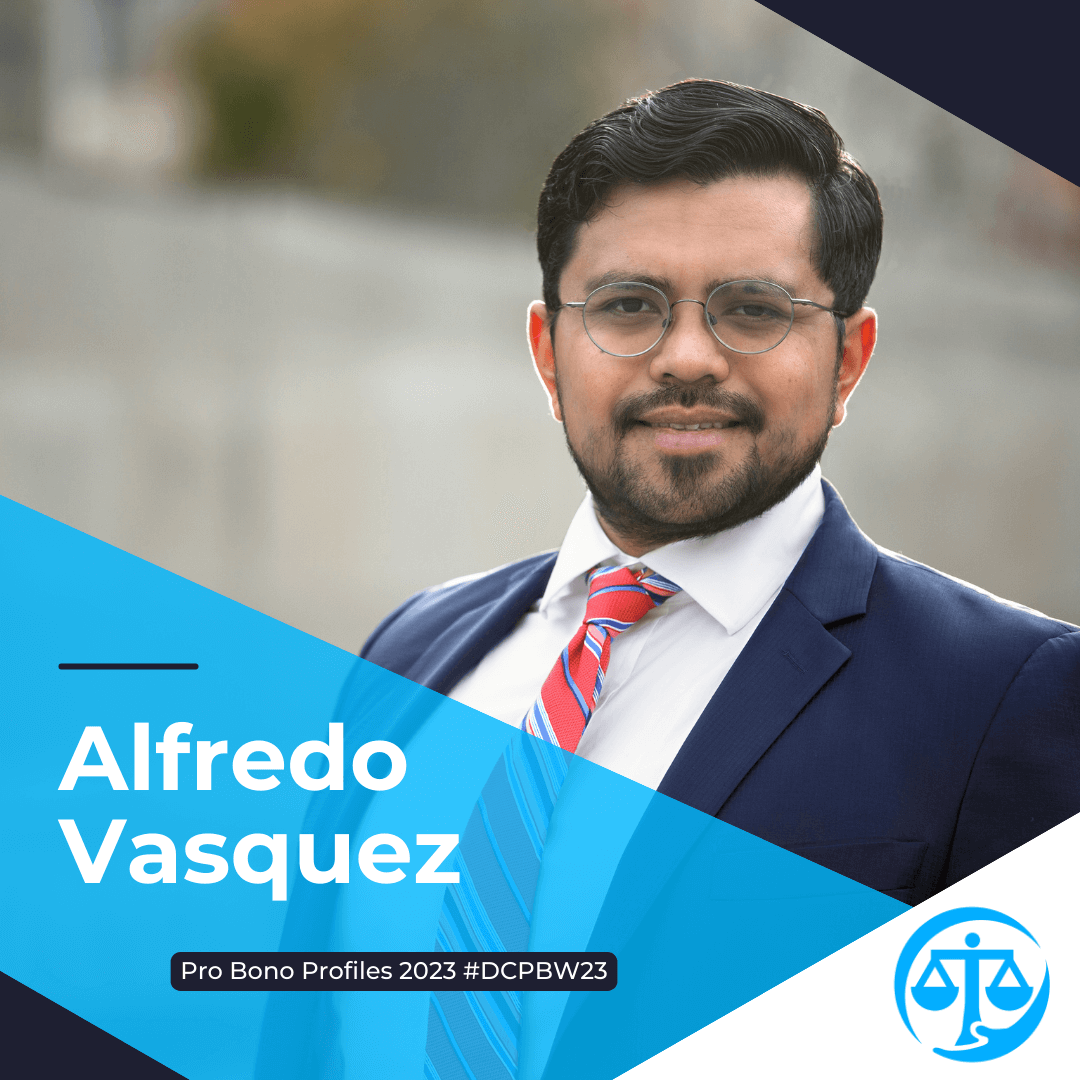
DC Pro Bono Week Profiles: Alfredo Vasquez
Even before he became a lawyer, Alfredo Vasquez was interested in pursuing a law practice that would make a positive impact. After college, he worked as a paralegal at Tahirih Justice Center, where one of the family law attorneys inspired him to go to law school and explore areas of law where he could represent individuals facing serious life challenges such as domestic violence, criminal proceedings, consumer debt, and evictions. During law school, he interned at the New Hampshire Public Defender Service, participated in the DC Law Students in Court (now Rising for Justice) clinic to represent tenants, and worked as an intern for a small law firm that represented students with disabilities.
“My law school clinical and internship experiences taught me that simply having a lawyer advocating for their interests can make a life-changing difference in outcomes for clients,” Alfredo says.
After law school, Alfredo gained experience working for Legal Services of Northern Virginia where he handled a high-volume practice representing tenants and debtors in Fairfax County. He then moved to the private sector, working for a small DC general practice law firm where he refined his legal skills by helping members of the hotel and restaurant union navigate their legal problems in a variety of areas.
All of that background situated him well to open his own law firm in 2020. He then joined DC Refers as a way to continue to represent people of modest means at affordable rates and to generate market-rate client business, too. DC Refers is an online directory of experienced lawyers who represent moderate-income people for below–market rates. This “low bono” practice helps bridge the access to justice gap by making legal representation affordable for ordinary people who otherwise have nowhere to turn for assistance.
Alfredo notes that the District of Columbia is an unusual legal market. “You get both ends of the spectrum,” he says. On the one hand, you have big law – mostly handling large-scale matters before federal agencies and courts. And, on the other hand, you have advocates in the nonprofit world who dedicatedly represent individuals with low incomes. But there are not many places for our DC neighbors with moderate incomes – 200-400% of federal poverty guidelines, or an annual income as low as $60,000 for a family of four – to turn to for affordable legal help. They don’t qualify for free legal services, and they can’t afford market rates that can run up to $400 or $500 per hour. “The demand for lawyers to serve moderate-income people is huge,” Alfredo says.
Alfredo encourages lawyers who want to engage in reduced-fee work for moderate-income clients to focus on areas of law they know well in order to streamline their practice and be effective, efficient advocates for each client. One case Alfredo handled highlights the importance of reduced-fee legal representation for people of modest means. A client came to Alfredo through DC Refers facing a wrongful eviction lawsuit from an apartment tenant. After an initial consultation with the client, Alfredo learned that the dispute centered on an oral sublease exacerbated by cultural misunderstandings and unfamiliarity with the role of the court. The landlord had nowhere to turn for legal advice and the tenant had highly effective pro bono representation. Alfredo took the case and was able to help the parties achieve a win-win settlement that benefited both sides: the landlord did not need to defend against expensive legal proceedings and the tenant secured a reasonable timeframe for moving to a new home. The court also was appreciative that both parties to the case were represented.
“The system is stacked against families with few resources,” Alfredo says. That’s why DC Refers and other organizations that connect people of modest means with affordable lawyers are fighting to increase access to justice for all.
“I enjoy being a part of DC Refers,” Alfredo says. “It provides an opportunity to serve my community while also growing my practice. It is nice to be a part of an organization that looks for ways to improve the legal system and the lives of our moderate-income neighbors.”






